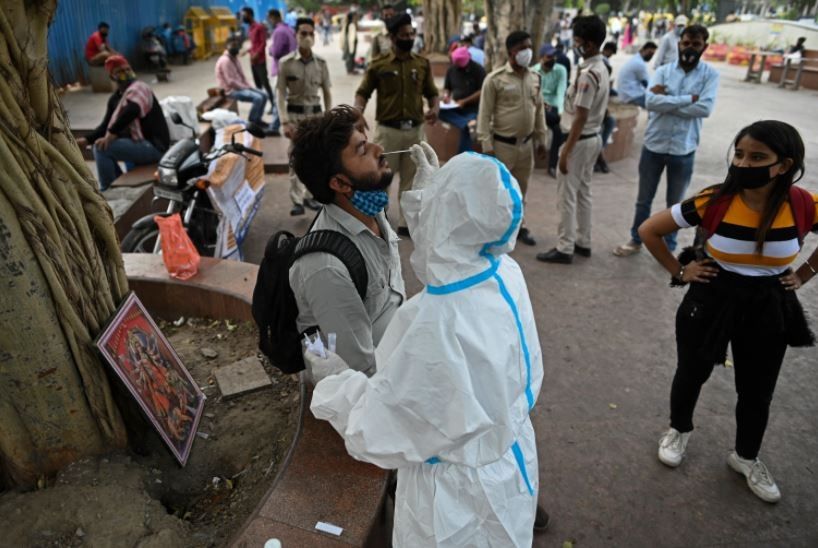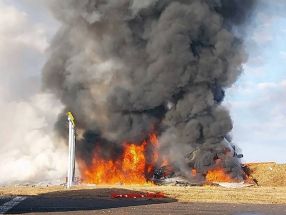One year from lockdown, India battles sluggish vaccine rollout and new surge

NEW DELHI, India — One year after imposing the world's biggest pandemic lockdown, India is racing against time to vaccinate its 1.3 billion population against COVID-19 as a new surge threatens to derail efforts to control the disease.
The world's second-most populous country is struggling to meet a target set by Prime Minister Narendra Modi to inoculate 300 million people by the end of July.
India has already suffered enough even though its case statistics are better than many feared.
When Modi announced a strict lockdown one year ago, millions of poor migrants lost their jobs overnight and fled big cities, many on foot and some dying on the way.
The harsh restrictions have gradually been eased to boost the economy and case numbers started dropping from September up to last month.
India has so far recorded more than 11.7 million COVID-19 cases — the third-most infected nation behind the United States and Brazil — and over 160,000 deaths, one of the lowest mortality rates among the worst-hit countries.
Authorities thought they had seen the worst of the pandemic and in January launched the huge inoculation drive on the back of being the world's biggest vaccine maker.
But a jump in infections — above 40,000 a day after falling to below 9,000 in February — and a slower-than-expected vaccination rollout is setting off alarm bells.
The western state of Maharashtra, home to financial capital Mumbai, has again become a major hotspot with authorities imposing local lockdowns and conducting on-the-spot virus tests in crowded places.
"We need to recognise that we are now facing an increasing number of cases in many parts of the country and vaccination has to be one of the key aspects of responding to that strategically," public health expert Anant Bhan told AFP.
'Target outbreak areas'
India kicked off its vaccination drive with healthcare and frontline workers, before expanding it to include over-60s and over-45s with serious illnesses. From April 1, everyone over 45 will also be eligible.
More than 50 million shots have been administered and about three million a day are being added, but at this rate the target will not be met.
Some experts and locals AFP spoke to said they wanted even more of the populace to be eligible for jabs.
"The vaccine has to be given to more people. Young people also," said 53-year-old New Delhi taxi driver Subba Rao Bellam.
Ashoka University physics and biology professor Gautam Menon said India should aim for up to 10 million vaccinations a day.
"That is the only thing that will really tide us over in the long term," he told AFP.
Anand Krishnan, a community medicine professor at the All India Institute of Medical Sciences in New Delhi, said "bureaucratic approaches to vaccination" were holding up the campaign that needs more flexibility.
Experts said flooding hotspot regions with vaccinations could help address the new outbreaks.
Other changes include involving more non-state providers, improving access to clinics for poorer and older recipients, and educating communities about the need for inoculations amid vaccine hesitancy.
They also called for less emphasis on using a government app — which has been hit by glitches — for registrations in a nation where many do not have internet access, and for problems in the underfunded health system to be addressed.
The health ministry has also raised concerns about vaccine wastage, which it estimates at 6.5 percent of the total used.
Vaccine diplomacy
India — which calls itself a pharmacy superpower because of its production strength — has meanwhile seized on the opportunity to use the vaccines as a diplomatic tool.
The nation is home to the Serum Institute of India, the world's biggest vaccine manufacturer and a major producer of the AstraZeneca/Oxford vaccine.
Bharat Biotech has also developed a local vaccine, which has yet to finish releasing its late-stage trials, that alongside the AstraZeneca shot is used in India and sent to other nations.
The government is supplying some 60 million shots to 76 countries, more than the number used in India.
But Serum has struggled to meet some export promises, including to Britain.
Experts said approving more vaccines for use in India would help reduce supply bottlenecks.
Even so, they said the new wave of infections showed that basic health measures such as wearing masks and social distancing remained necessary.
Crowding in public places, at state election rallies and at religious festivals were the main reason why the disease was spreading quickly again, they added.
"We have to keep remembering vaccines are not some kind of magical solution," Bhan said. — with Aishwarya Kumar and Atish Patel
- Latest
- Trending
































